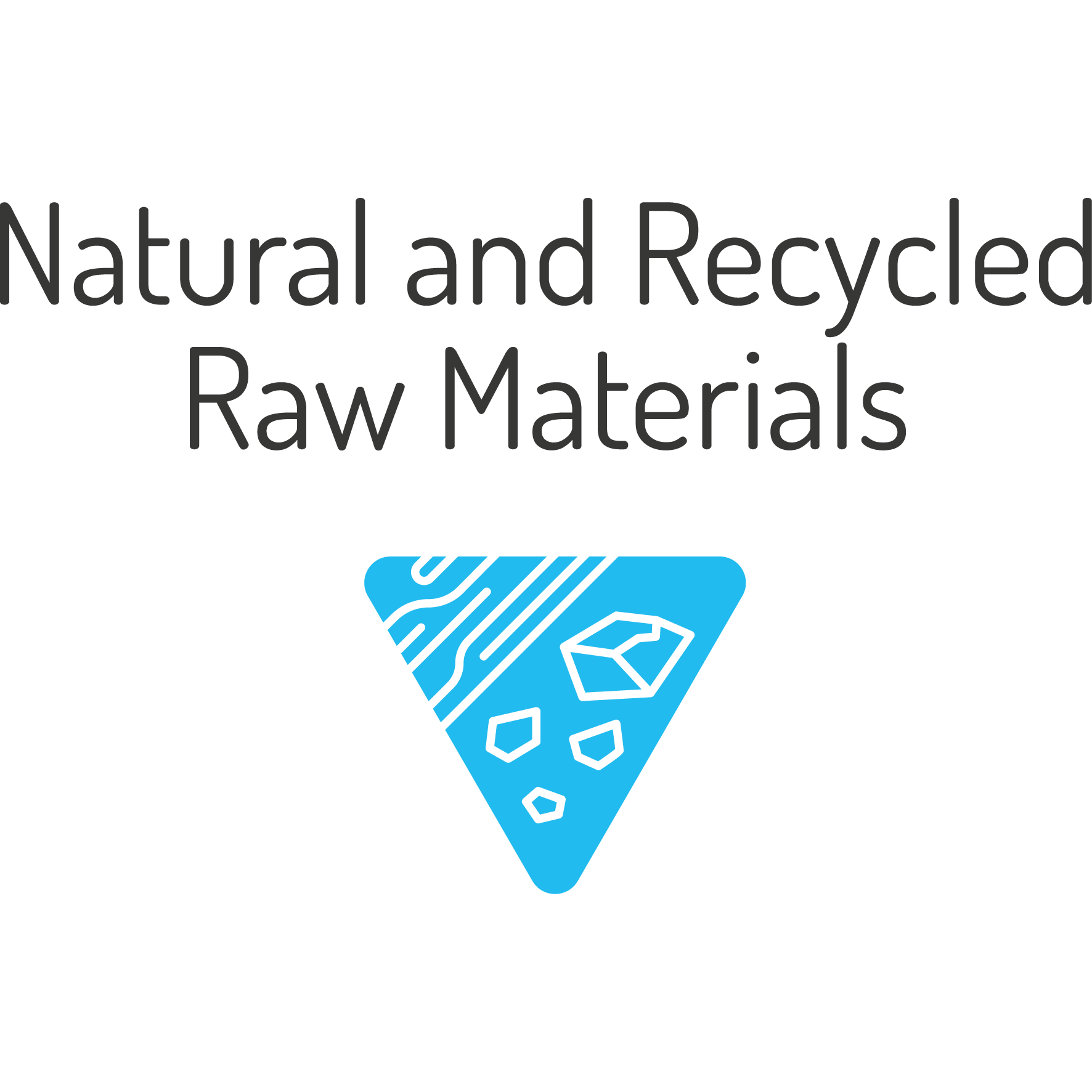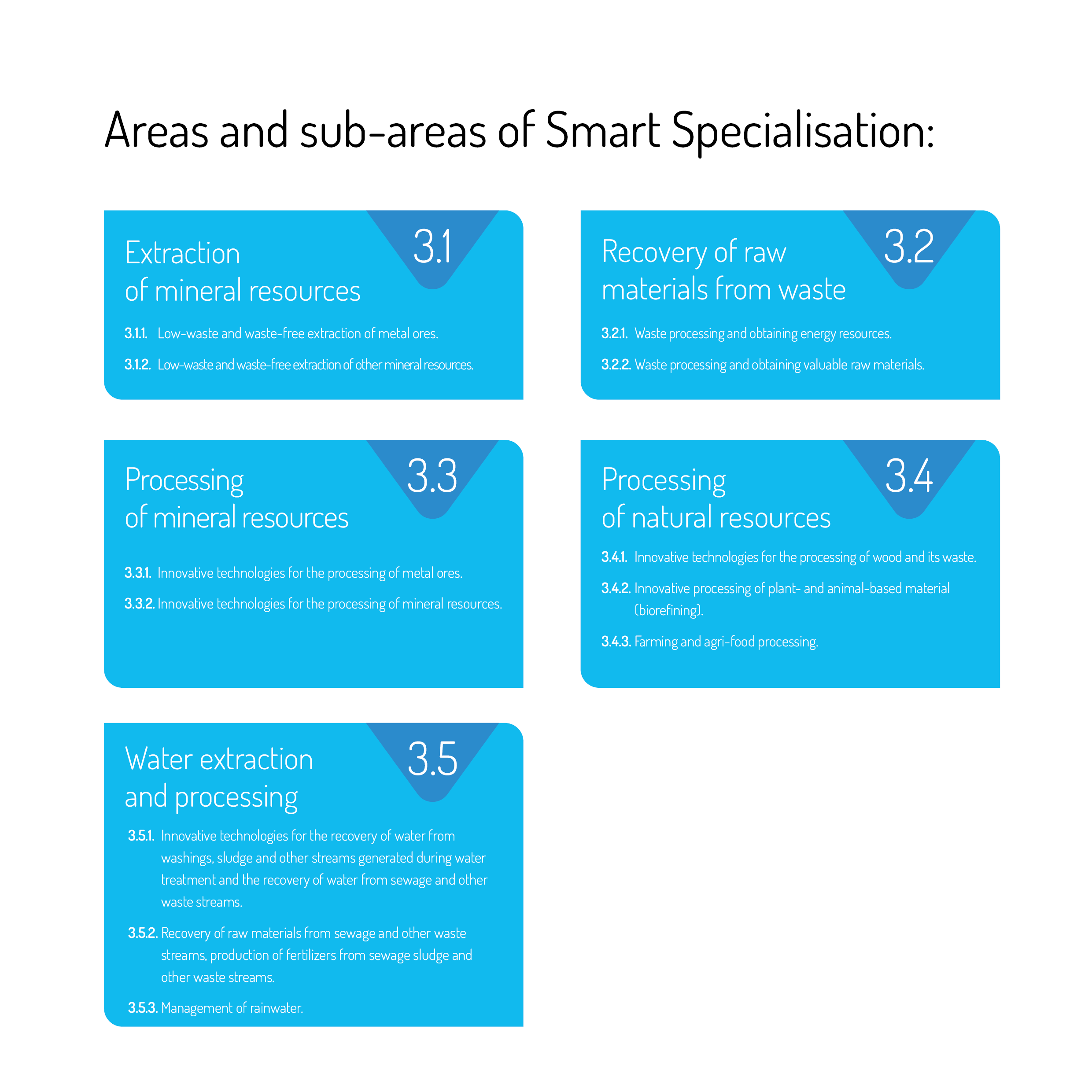
The specialisation ‘Natural and recycled raw materials’ - encompasses areas related to the extraction of mineral raw materials (in particular low- and zero-waste technologies) and the extraction of raw materials from waste (including energy materials and raw materials for further processing). A large area of specialisation is in technologies for the processing of metal ores, other mineral raw materials, natural raw materials (wood and its waste, other materials of plant and animal origin - in ‘biorefining’ processes) and - in connection with the special place of water in the economy - water extraction and processing.
The smart specialisation 'Natural and recycled raw materials' is a very broad and diverse specialisation. It was established in 2015 and, in addition to the area concerning the extraction, processing and use of natural and recycled raw materials, included the entire industry dealing with advanced materials (nanotechnology, composites) and wood extraction and processing. The individual branches of this specialisation were very different from each other, both in terms of their share of volume and value in the overall balance sheet, as well as in terms of the technologies used, the level of technological advancement, the size of the companies, or the level of employment.
The excessive range of industries included in the specialisation and the lack of technological and material linkages between branches resulted in huge differences in the expectations and needs of individual enterprises. This selection hindered the efficient management of support and limited the ability to target personalised solutions for the entire industry. Therefore, steps were taken to define this smart specialisation more coherently, e.g. by considering moving the advanced materials sub-industry entirely into the chemical specialisation.
The analysis of changes allowed the precise selection of groups of entities whose condition significantly influences the location factor for the entire specialisation. When comparing the results for the analysed economic aspects, most of Lower Silesian advantages were found in the case of industries and sectors:
- Metal ore mining;
- Other mining and quarrying.
Further down, among the industries and sectors relating to industrial production, the following sector stood out (having advantages in at least two groups of indicators): manufacture of other non-metallic mineral products (employees and REGON).
Among the other industries and sectors, operating partly for the benefit of local communities but also largely providing services to other sectors, the following sectors were noteworthy:
Water abstraction, treatment and supply (employees and expenditures on innovation);
Waste collection, treatment and disposal activities, recovery of raw materials (employees and expenditures on innovation);
Remediation activities and other waste management service activities (REGON and expenditures on innovation).
All of these premises allowed the formulation of the Lower Silesian Smart Specialisation ‘Natural and Recycled Raw Materials’ in its current form.
The following areas and sub-areas of specialisation have been identified:

3.1.1.
Specialisation encompasses technologies for low-waste or zero-waste extraction of metal ores, i.e. where the amount of waste generated is minimised and the resulting waste is managed according to the waste hierarchy (waste prevention, preparation for reuse, recycling or other recovery).
3.1.2.
Specialisation encompasses technologies for low- or zero-waste extraction of other minerals including stone, i.e. where the amount of waste generated is minimised and the waste generated is managed in accordance with the waste hierarchy (waste prevention, preparation for re-use, recycling or other recovery).
3.2.1.
Processing of municipal, agricultural and industrial waste by composting, gasification and fermentation processes into energy products or directly into energy (heat or electricity).
3.2.2.
Processing of municipal, agricultural and industrial waste in processes and extraction of valuable raw materials (apart from energy raw materials).
3.3.1.
Specialisation encompasses process innovation involving the implementation of new or significantly modified metal ore processing technologies.
3.3.2.
Specialisation encompasses process innovations involving the implementation of new or significantly modified mineral processing technologies, with the exception of metal ores.
3.4.1.
Specialisation encompasses process innovations involving the implementation of new or significantly modified technologies for the processing of wood and wood waste (in particular pyrolysis, extraction and hydrolysis processes) into chemical raw materials, fuels and fuel additives.
3.4.2.
Specialisation encompasses process innovations involving the implementation of new or significantly altered technologies for the processing of material of biological origin (in particular plant material - with the exception of wood and animal material) during which the matter is separated into biological (organic) and chemical components used as raw materials for the chemical, pharmaceutical and cosmetic industries and functional foods in other applications.
3.4.3.
Specialisation encompasses the breeding of plants and animals with improved functional values for the production of organic, traditional and regional food, and the development or implementation of new or significantly changed technologies in agri-food processing or animal breeding, taking into account, inter alia, increased productivity and reduced environmental nuisance.
3.5.1.
Specialisation encompasses technologies for the highly efficient treatment of water with a high pollutant load, including: recovery to return treated rainwater to the beginning of the water treatment system for human consumption and recovery of water from treated wastewater, raw sewage and other waste streams for agricultural, industrial use, among others.
3.5.2.
Specialisation encompasses the recovery of raw materials from treated wastewater, raw sewage and other waste streams for fertiliser production, among others, as well as the production of fertilisers from sewage sludge and other waste streams.
3.5.3.
Specialisation encompasses solutions for the local and systematic management of rainwater directed at, among other things, minimising the use of clean water.
